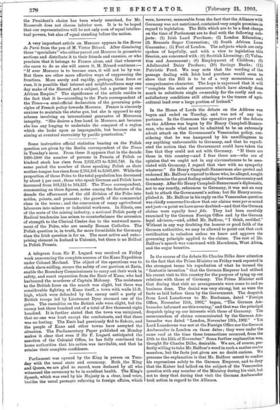In the House of Lords the debate on the Address
was begun and ended on Tuesday, and was not of any im. partance. In the Commons the operative part of the debate on the Address was begun by Sir Henry Campbell-Banner. man, who made what must be admitted to be an extremely adroit attack on the Government's Venezuelan policy, con- sidering that he was hampered by his unwillingness to say anything unfavourable to Germany, and that he repudi- ated the notion that the Government could have taken the line that they could not act with Germany. " If there are those in this country—and I fear there are—who are of opinion that we ought not in any circumstances to be asso- ciated with Germany, I regard that view with no sympathy whatever." Sir Henry Campbell-Bannerman also quoted and endorsed Mr. Balfour's reproof to those who, he alleged, sought to undermine the good feeling existing between this country and Germany. After Sir Henry Campbell-Bannerman's diplomatic, not to say courtly, references to Germany, it was not an easy task to attack the Government's action; but Sir Henry accom- plished it. Mr. Balfour in his reply on the Venezuelan question was chiefly concerned to show that our claims were per se sound and just—a point we have never doubted—and that the German claims were equally boriii fide. They had been carefully examined by the German Foreign Office and by the German legal advisers,—and, added Mr. Balfour, " I think, certified." Without in any way doubting the honour or good faith of the German authorities, we may be allowed to point out that such certification is valueless unless we know and approve the governing principle applied to the claims. The rest of Mr. Balfour's speech was concerned with Macedonia, West Africa, and the sugar bounties.










































 Previous page
Previous page